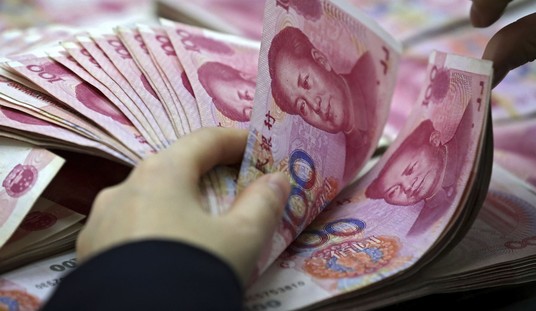A few years ago, if General Motors and Chrysler tried to merge, the bureaucrats at either the Justice Department or Federal Trade Commission almost surely would have interfered and prevented the marriage from taking pace. Today, the federal government is looking for ways to subsidize a merger of the two auto giants, perhaps by tapping into the $700 billion Congress approved to bail out the highfliers on Wall Street.
But this is just part of the story. Earlier this year, the auto companies put their lobbying muscle and campaign contributions to work and got the politicians in Washington to approve a $25 billion “loan” from taxpayers. Now the auto companies are looking to stick their snouts further in the trough by transforming their financing subsidiaries into bank holding companies so they can get more unearned money.
Unfortunately, very few people are asking whether it is a good idea to let politicians and bureaucrats intervene in private markets, and this is the fundamental issue — regardless of whether they are trying to hurt companies or help companies. The absence of any adult leadership, combined with the precedent created by the Wall Street bailout, seems to have triggered a feeding frenzy in Washington. The auto industry is first in line, but it may just be a matter of time before every poorly-managed and uncompetitive industry looks to line its pockets at the expense of taxpayers.
Bailouts and subsidies are bad policy. Government intervention invariably is a recipe for inefficiency and slower growth. Yet bad policy often is good politics (at least in the short term). Politicians thus have an unerring instinct to make bad decisions, and their efforts to subsidize the auto industry are a classic example. For instance:
- Subsidies harm growth by replacing market forces with special-interest politics. There is a reason why nations such as France suffer from slower growth and higher unemployment. When politicians have control of the economy, resources are allocated based on political power and bottom-line economic factors are, at best, secondary. Politicians apparently do not understand that governments never create wealth, they only redistribute it. Every dollar the government spends for bailouts and subsidies first has to be taxed or borrowed from the private sector.
- Subsidies reward companies with the best lobbyists, not the ones with the best products. Every time government expands in size, or seizes new power over the economy, it gives companies and other interest groups an incentive to use more of their resources to play the Washington game of lobbying for unearned wealth. At best, this is a zero-sum game, as any loot obtained by one interest group means fewer resources in the productive sector of the economy. When businesses focus on trying to make money by serving the interests of consumers, by contrast, everyone wins since free markets are based on voluntary exchange.
- Subsidies destroy more jobs than they save. One of the big arguments for bailouts and subsidies is that jobs will be saved. This is true, but only if one ignores the other side of the equation. As noted earlier, governments can only give money to one group of people by first taking it from another group of people. This means either taxes that discourage productive activity or government borrowing that displaces private sector investment. Regardless of how government spending is financed, and the scholarly evidence shows that net effect is to reduce total employment.
- Subsidies entrench incompetent management and myopic unions. American auto companies suffer from self-inflicted problems. There is a bloated and inefficient management structure, which is a problem that will get worse if Detroit gets to stick its collective hands into the pockets of taxpayers. Moreover, unions have behaved in a self-destructive manner, putting companies in the hole by insisting on featherbedding and absurd work rules. Bailouts and subsidies perpetuate these misguided practices.
One of the most perverse arguments for the bailout of auto companies is that politicians already squandered $700 billion on a failed bailout of Wall Street, so it should not be a big deal to give taxpayer funds to General Motors, Ford, and Chrysler. But as our parents probably told us at some point, two wrongs don’t make a right. Just because politicians made one mistake, that is hardly a good reason to travel down the same path — especially when the evidence already indicates that the Wall Street bailout has been a dismal failure. Financial markets have declined and the overall economy has stumbled ever since Treasury Secretary Paulson decided that his friends on Wall Street deserved handouts from the taxpayers. This is hardly a surprise since many people warned that repeating the mistakes made by Japan in the 1990s was going to hurt the economy.
If politicians really want to help the auto industry, they should reduce the burden of government. America’s corporate tax rate is 35 percent, for instance, and rises to nearly 40 percent if state corporate taxes are included. This means the United States has the world’s second-highest corporate tax burden: a rate higher than every single European nation, even welfare states such as France and Germany. The corporate tax rate should be slashed substantially, down to at least 20 percent. This would boost the entire economy and generate substantial new investment. Politicians also could make much-needed changes to regulatory policy and labor policy — reforms that would benefit all companies, not just GM, Ford, and Chrysler.
Some people wonder if America no longer is a good place to manufacture cars, but that is not the right question. After all, Nissan, Toyota, BMW, and Mercedes are among the foreign companies that have been expanding their American production. The problem is that American companies and the United Auto Workers have refused to undergo long-overdue restructuring.
This is why bankruptcy may be the best option. This does not mean the companies disappear. But it does mean that both management and union will be forced to deal with reality and make the changes needed to compete.









Join the conversation as a VIP Member